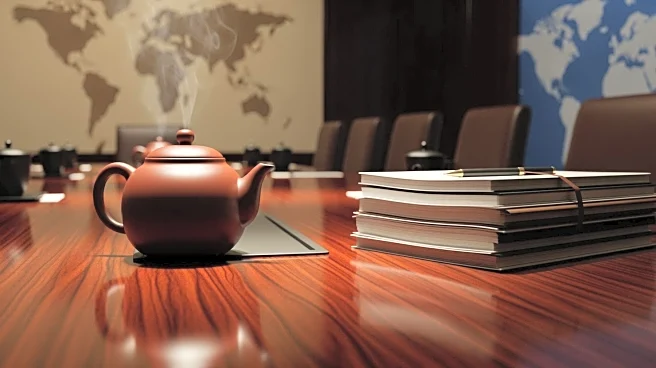What's Happening?
Treasury Secretary Scott Bessent is scheduled to speak by phone with Chinese Vice Premier He Lifeng on Friday to discuss ongoing trade negotiations between the United States and China. This conversation
comes at a critical time as the U.S.-China relationship has recently experienced strain due to new export controls imposed by Beijing. In response, President Trump has threatened to implement a 100% tariff on Chinese imports, a move he described as unsustainable but necessary. The call between Bessent and Lifeng could potentially signal progress in easing these tensions, although specific details about the timing and agenda of the call remain unclear.
Why It's Important?
The dialogue between Treasury Secretary Bessent and Vice Premier Lifeng is significant as it may influence the future of U.S.-China trade relations, which are crucial for global economic stability. The imposition of tariffs and export controls can have far-reaching impacts on industries reliant on international trade, potentially affecting prices and supply chains. Businesses and consumers in both countries could face increased costs, while sectors such as technology and manufacturing might experience disruptions. The outcome of these talks could either alleviate or exacerbate existing economic pressures, making it a pivotal moment for stakeholders involved.
What's Next?
While the immediate outcomes of the call are uncertain, potential next steps could include further negotiations or adjustments to trade policies. Stakeholders such as political leaders, businesses, and trade organizations will be closely monitoring the situation for any signs of resolution or escalation. The U.S. administration may consider alternative strategies to address trade imbalances, while China might seek to negotiate terms that mitigate the impact of tariffs. The international community will be watching for any developments that could influence global trade dynamics.
Beyond the Headlines
The trade discussions between the U.S. and China also highlight broader geopolitical tensions and the complexities of international diplomacy. The economic policies and decisions made by these two major powers can have ripple effects across the globe, influencing market stability and international relations. Ethical considerations regarding trade practices and economic fairness may also come into play, as both nations navigate the challenges of maintaining competitive yet cooperative economic ties.











